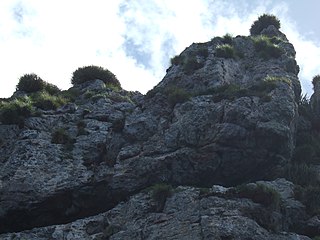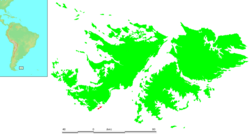
The history of the Falkland Islands goes back at least five hundred years, with active exploration and colonisation only taking place in the 18th century. Nonetheless, the Falkland Islands have been a matter of controversy, as they have been claimed by the French, British, Spaniards and Argentines at various points.

The Falkland Islands are located in the South Atlantic Ocean between 51°S and 53°S on a projection of the Patagonian Shelf, part of the South American continental shelf. In ancient geological time this shelf was part of Gondwana, and around 400 million years ago split from what is now Africa and drifted westwards from it. Today the islands are subjected to the Roaring Forties, winds that shape both their geography and climate.
The economy of the Falkland Islands, which first involved sealing, whaling and provisioning ships, became heavily dependent on sheep farming from the 1870s to 1980. It then diversified and now has income from tourism, commercial fishing, and servicing the fishing industry as well as agriculture. The Falkland Islands use the Falkland pound, which is backed by the British pound.
The Falkland Islands currently has three primary means of transport - road, sea and air. However, in 1946, when Sir Miles Clifford arrived as governor, there were no air services, no roads outside Stanley and an indifferent sea service. Sir Miles was instrumental in starting the Falkland Islands Government Air Service in December 1948. The inaugural flight involved a mercy flight from North Arm Settlement to Stanley to bring a girl with peritonitis to life-saving medical help in Stanley. There is now an international airport, a domestic airport, a number of airstrips, a growing road network and a much-improved ferry service between the two main islands.

The Poor Knights Islands are a group of islands off the east coast of the Northland Region of the North Island of New Zealand. They lie 50 kilometres (31 mi) to the northeast of Whangārei, and 22 kilometres (14 mi) offshore halfway between Bream Head and Cape Brett. Uninhabited since the 1820s, they are a nature reserve and popular underwater diving spot, with boat tours typically departing from Tutukaka. The Poor Knights Islands Marine Reserve surrounds the island.

West Falkland is the second largest of the Falkland Islands in the South Atlantic. It is a hilly island, separated from East Falkland by the Falkland Sound. Its area is 4,532 square kilometres, 37% of the total area of the islands. Its coastline is 1,258.7 kilometres long.

Staats Island is an uninhabited island of the Beaver Island Group in the Falkland Islands. It lies between Beaver Island and Weddell Island, parallel to Tea Island and is 500 hectares in area.

Pebble Island is one of the Falkland Islands, situated north of West Falkland. It is possibly named after the peculiarly spherical pebbles found at its western tip.

The Falkland Sound is a sea strait in the Falkland Islands. Running southwest-northeast, it separates West and East Falkland.

The Falkland Islands Company Ltd is a diversified goods and services company owned by FIH Group. Known locally as FIC, it was founded in 1851 and was granted a royal charter to trade in 1852 by Queen Victoria. It was originally founded by Samuel Fisher Lafone to exploit wild cattle in East Falkland, but they gave way to sheep farming and then to a range of trading activities in the Falkland Islands ranging from retail shops and cafés to insurance and vehicle hire.

Port Albemarle is a settlement on West Falkland, in the Falkland Islands. It is in the far south of the island, on the east side, at the southern end of Falkland Sound.

Kidney Island so called due to its shape, is a small island with a land area of 33 hectares, to the east of East Falkland, not far from Stanley. It lies is at the east end of Berkeley Sound near Kidney Cove, and is separated from Port William by Menguera Point. It is a nature reserve and, unlike most of the main islands, is still covered in tussac grass. Its wildlife includes penguins and sea lions. It is one of only three places in the archipelago where king penguins breed; the others are Saunders Island and Volunteer Point on East Falkland.
Cape Pembroke is the easternmost point of the Falkland Islands, and is on East Falkland. There is an automated lighthouse here.

Falkland Islanders, also called Falklanders and nicknamed Kelpers, are the people of the British Overseas Territory of the Falkland Islands.

Foreign relations between the Argentine Republic and the United Kingdom of Great Britain and Northern Ireland have existed for over two centuries.

Lady Elizabeth is a wrecked iron barque of 1,155 tons built by Robert Thompson Jr. of Southwick, Sunderland and launched on 4 June 1879. Robert Thompson Jr. was one of the sons of Robert Thompson Sr. who owned and operated the family ran shipyard J. L. Thompson & Sons. Thompson Jr. eventually left the family business in 1854 to start his own shipbuilding business in Southwick, Sunderland. The ship was built for John Wilson as a replacement for the 658-ton, 1869-built barque Lady Elizabeth which sank off Rottnest Island, Western Australia in 1878.

Lesbian, gay, bisexual, and transgender (LGBT) people in the British Overseas Territory of the Falkland Islands enjoy most of the same rights as non-LGBT people. Marriage and civil partnerships have been open to both opposite-sex and same-sex couples since 29 April 2017. Discrimination on the basis of sexual orientation is constitutionally banned. Additionally, attitudes are largely positive; a public consultation found that 90% of respondents were in favour of same-sex marriage.

Religion in the Falkland Islands is predominantly Christianity, of which the primary denominations are Church of England, Roman Catholic, United Free Church, Lutheran, Jehovah's Witnesses, Seventh-day Adventists among others. In the 2006 census most islanders identified themselves as Christian, followed by those who refused to answer or had no religious affiliation. The remaining 1.3 percent were adherents of other faiths.

Mount Alice is a mountain rising to 361 m (1,180 ft) at the south extremity of West Falkland, Falkland Islands in the South Atlantic. It is situated between the bays of Port Stephens and Port Albemarle, 12.3 km (7.6 mi) due north of Cape Meredith.
















